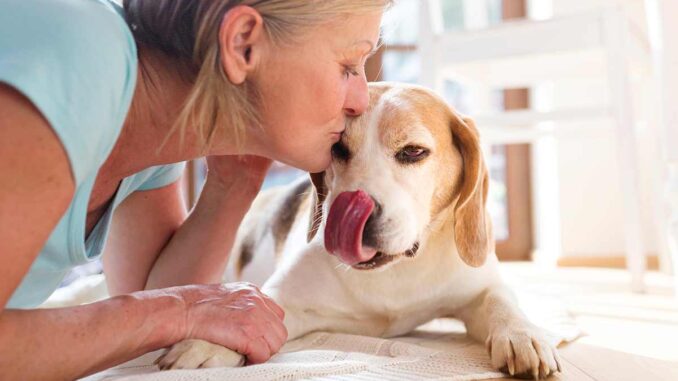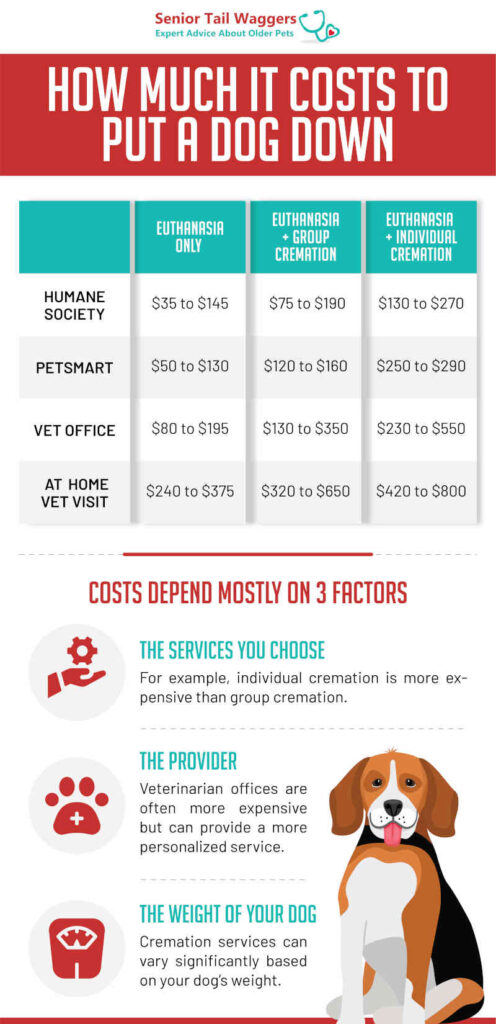
This article was updated on July 24th, 2023
Facing the difficult decision to say a final goodbye to a beloved family pet is made even more difficult when finances must be considered. Our dogs are there when we wake up every morning, eagerly waiting for us to arrive home from school or work every day. When the end finally comes, it can be heart-breaking. It’s especially challenging when we need to consider how much it can cost to euthanize a dog.
Key highlights:
– The cost of euthanasia can vary significantly based on the provider and weight of your dog.
– The Humane Society is often the cheapest option, from $75 for small dogs to $220 for large dogs (with group cremation).
– Veterinary clinics are often more expensive, $130 to $350, but offer personalized service.
– At-home euthanasia offers a more intimate and stress-free solution at a higher cost, $320 to $650.
– Individual cremation (with ashes returned to you) is more expensive.
– Costs vary based on your dog’s weight: this article contains estimates by weight.
Cost by provider & by service:
We have outlined the costs by provider in the table below. We have used a range because prices often vary based on your dog’s weight (Keep reading for cost estimates based on your dog’s weight).
| Euthanasia only (owner takes pet back) | Euthanasia + Group Cremation | Euthanasia + Individual Cremation | |
| Humane Society | $35-$145, based on weight | $75-$220, based on weight | $130-$270, based on weight |
| PetSmart’s Banfield Clinics | $50-$130 | $120-$160 | $250-$290 |
| Your Vet Office | $80 to $195 (see examples) | $130-$350 | $230-$550 |
| At-home Vet Visit | $240-$375 | $320-$650 | $420-$800 |

Since you already know your dog’s weight approximately, let’s review the costs of euthanasia based on your dog’s weight.
Euthanasia Costs Based On Your Dog’s Weight
The Humane Society is typically the cheapest way to put your dog down with costs rangin from $75 to $190, depending on your pet’s weight. The table below shows an estimate of the costs to euthanize your dog at the Humane Society, based on your dog’s weight:
| Your Dog’s Weight | Euthanasia Only | Euthanasia and Group Cremation | Euthanasia and Individual Cremation |
| up to 10 pounds | $50-$70 | $75-$130 | $110-$180 |
| 11 to 50 pounds | $60-$80 | $130-$170 | $190-$230 |
| 51 to 100 pounds | $70-$90 | $180-$220 | $240-$280 |
| 101 to 150 pounds | $90-$110 | $200-$240 | $250-$325 |
| 151+ pounds | $125-$145 | $220-300 | $270-$390 |
(See information about the Humane Society End of Life services)
Euthanasia Services By Providers
1. Banfield Veterinary Clinics
Euthanasia packages with group cremation usually cost around $130-$160 at PetSmart’s Banfield animal clinics. You can use their price estimator, along with your Zip code, for the price at your location (look for the “Euthanasia package” price, which includes group cremation based on our phone calls – additional costs of approximately $130 will apply if you want individual cremation with ashes returned to you).
2. Your veterinarian’s office
Your average cost could range from $80 to $195. The cost may vary based on your pet’s weight and the facility’s location.
3. At-home euthanasia
Many dogs find a veterinarian’s clinic stressful regardless of what you do, making a completely stress-free euthanasia impossible. At-home euthanasia offers a much more intimate, private, and stress-free solution.
While this is often easier for your pet, there is more preparation required and the overall time commitment is significantly greater. On average, at-home euthanasia ranges from $240 to $375.
What Types of Costs do I Need to Consider?
The cost to euthanize a dog is largely dependent upon the services you choose and your dog’s weight. Services include:
1) Euthanasia
2) Group cremation (ashes NOT returned to you)
OR
3) Individual cremation (ashes returned to you).
Costs also vary based the provider performing the euthanasia. Your provider options include:
1) the Humane society, a non-profit association,
2) Petsmart’s Banfield clinic or a pet hospital network like Banfield,
3) Your veterinarian’s office, and
4) At-home veterinarian euthanasia services, with a vet coming to your home.
More About Aftercare Services (Cremation and Burial)
Aftercare services include pet crematorium transportation or either communal, private, or memorial cremation. Cremation services will add an additional fee, usually based on your pet’s weight.
This normally costs between $75-$550.
Private cremation
Your pet is cremated individually, and privately. Then ashes can then be returned to you. Facilities and location determine specific costs.
Communal cremation
When you make this decision, your pet will be cremated with others. Individual ashes won’t be returned. Ashes are disposed of in either facility grounds or on a specified memorial area by crematory staff.
Pet cemetery burial
Depending on the area you live, burying your pet in your backyard is often illegal. However, you still have the option of a pet cemetery burial.
This includes a burial plot, an optional burial stone, and several options for a casket. Your average cost could range from $400 for a small pet to several thousand dollars, depending on the options you choose.
Who is legally allowed to euthanize domestic pets?
Currently, 49 out of 50 states in the US have passed legislation regarding pet euthanasia, mandating it only be carried out by a licensed Doctor of Veterinary Medicine or veterinary technician under the supervision of a licensed veterinarian, though specific regulations can vary by state.
Owner-induced euthanasia (you euthanize your dog yourself at home) is almost always illegal. This is only an option in certain states if your pet meets very specific criteria:
- Severely injured or so sick death is imminent
- Medically “unfit” for living (losing several limbs, severe brain damage)
It is also important to note that there are NO safe and humane euthanasia methods that can be performed by owners.
What is the euthanasia process?
Euthanasia involves humanely ceasing a dog’s vital life functions, allowing the animal to peacefully pass and ending its’ suffering. The process is meant to offer both pain-free and stress-free relief for animals in extreme discomfort or suffering from chronic and incurable health complications.
First, the animal receives a sedative, allowing them to calmly enter a sleep state. Then, most veterinarians will intravenously give a medication called pentobarbital. Finally, the animal’s heart, lungs, and brain functions should cease within two minutes.
Your pet may feel the initial needle prick. After that, your dog slowly drifts off while asleep, free from pain and distress.
Why is owner-administered euthanasia a bad idea?
Choosing to euthanize your pet yourself is a terrible idea. While it may be tempting to save on costs, there are many reasons to get your pet to a professional.
Legality: First, owner-administered euthanasia is nearly always illegal. The punishment will vary depending on state legislation, but you could be looking at prison time and a fine.
If your actions are considered animal cruelty, you could be facing a much harsher punishment.
Difficulty: Second, most owners do not have a sufficient background in medicine to make sure owner-administered euthanasia is humane. Without proper training, you may cause your animal unnecessary pain and suffering.
Managing remains: Finally, because of other predatory animals, water contamination, and other unforeseen complications, many states prohibit at-home burials. Owners at home struggle to respectfully manage their pet’s remains.
Saying goodbye
True euthanasia offers pain relief to an animal suffering from a severely diminished quality of life.
Sometimes, this is ultimately the kinder, gentler option. No one wants their precious furry family member to suffer needlessly until the end.
In the end, while financial matters can’t be ignored, decisions should be made for the good of our pets. They deserve nothing less.
Related Posts about Euthanasia & Putting A Dog To Sleep:
 6 Signs It Is Time to Euthanize a Dog with Congestive Heart Failure - When dealing with congestive heart failure (CHF), the decision to euthanize is complex due to the progressive nature of the… [...]
6 Signs It Is Time to Euthanize a Dog with Congestive Heart Failure - When dealing with congestive heart failure (CHF), the decision to euthanize is complex due to the progressive nature of the… [...] My Dog Stopped Eating: Should I Consider Putting Him Down? - Sometimes I get a call from an owner asking: “Doc, my dog won’t eat anything. What should I do?” I… [...]
My Dog Stopped Eating: Should I Consider Putting Him Down? - Sometimes I get a call from an owner asking: “Doc, my dog won’t eat anything. What should I do?” I… [...] Bucket List: 18 Things to Do Before Putting Your Dog to Sleep - At Senior Tail Waggers, we talk a lot about the difficult process of putting your dog to sleep and saying… [...]
Bucket List: 18 Things to Do Before Putting Your Dog to Sleep - At Senior Tail Waggers, we talk a lot about the difficult process of putting your dog to sleep and saying… [...] A Vet Explains When to Euthanize A Dog With a Spleen Tumor - There can be nothing quite as devastating as finding out your dog has a spleen tumor. There are many questions… [...]
A Vet Explains When to Euthanize A Dog With a Spleen Tumor - There can be nothing quite as devastating as finding out your dog has a spleen tumor. There are many questions… [...] Should You Euthanize A Dog With Vestibular Disease? - After 14 years of working as a vet, I can diagnose some client concerns in an instant. When a client… [...]
Should You Euthanize A Dog With Vestibular Disease? - After 14 years of working as a vet, I can diagnose some client concerns in an instant. When a client… [...] Our Vet Explains When to Euthanize a Diabetic Dog - It can be excruciatingly difficult for owners to accept that their diabetic dog might be suffering. Unfortunately, there may come… [...]
Our Vet Explains When to Euthanize a Diabetic Dog - It can be excruciatingly difficult for owners to accept that their diabetic dog might be suffering. Unfortunately, there may come… [...] 11 Tips from a Therapist for Grieving the Loss of a Dog After Euthanasia - Losing a pet is not easy. In my life, I have lost three great pets. They lived well beyond their… [...]
11 Tips from a Therapist for Grieving the Loss of a Dog After Euthanasia - Losing a pet is not easy. In my life, I have lost three great pets. They lived well beyond their… [...] Signs that Your Dog is Dying from Cushing’s Disease - Making the decision to euthanize a dog with Cushing’s disease is not easy;. Due to the slow progression of the… [...]
Signs that Your Dog is Dying from Cushing’s Disease - Making the decision to euthanize a dog with Cushing’s disease is not easy;. Due to the slow progression of the… [...] When to Euthanize Dog with Tracheal Collapse [Vet Advice] - From giving us companionship and unconditional love to providing us with endless entertainment, the connection you have with your dog… [...]
When to Euthanize Dog with Tracheal Collapse [Vet Advice] - From giving us companionship and unconditional love to providing us with endless entertainment, the connection you have with your dog… [...] When to Euthanize a Dog with Kidney Failure: The Last Days - Choosing the right time to euthanize a dog because of kidney failure is without a doubt the hardest decision any… [...]
When to Euthanize a Dog with Kidney Failure: The Last Days - Choosing the right time to euthanize a dog because of kidney failure is without a doubt the hardest decision any… [...]Disclaimer: This website's content is not a substitute for veterinary care. Always consult with your veterinarian for healthcare decisions. Read More.


Thank you for breaking down the costs associated with dog euthanasia. It’s such a difficult decision for pet owners, and having this information really helps in understanding the financial aspect. It’s comforting to know what to expect during such a tough time.
Thank you for breaking down the costs of dog euthanasia. It’s such a tough decision, and knowing the potential expenses really helps pet owners prepare for that heartbreaking moment. Your insights on how prices vary by provider and weight are especially useful.
Thank you for breaking down the costs associated with dog euthanasia. It’s such a tough decision, and knowing the price range based on provider and weight really helps pet owners prepare for this emotional time. Reading this gave me some clarity during a difficult moment.
Thank you for breaking down the costs associated with dog euthanasia. It’s a difficult decision, and having a clear understanding of expenses can really help pet owners in planning. I appreciate the information on how pricing varies by provider and dog size. It’s important to have this transparency during such a tough time.